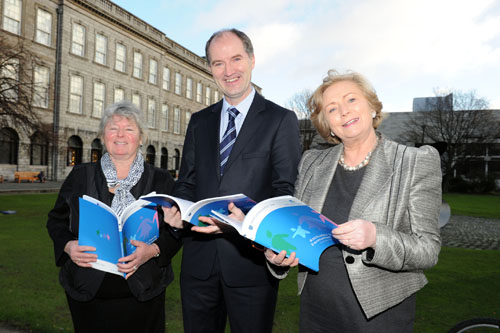A Major Study on Attitudes to Family Formation in Ireland Launched by Minister for Children & Youth Affairs
Posted on: 09 December 2011
A study into attitudes to family formation in Ireland has found that in spite of the increase in cohabitation, there is still strong support for marriage and it is a state that most people aspire to. While people see marriage as involving more commitment, cohabitation is widely accepted and seen as a step in a progression towards marriage:
– 84% believe that it is better to live with someone before you marry them;
– 85% feel that the religious reasons for marriage have become less important;
– 69% think that while marriage provides a solid family basis, cohabiting does too;
– 69% think that deciding to have a child together would be a far greater commitment than getting married;
– 49% of the sample had cohabited at least once.
Being married was found to be associated with the greatest level of overall well-being. Cohabiting was associated with the next highest level of well-being, and being single with the lowest level, with older single women, being at particular risk. Single mothers have the lowest level of well-being of all groups closely followed by single men of lower socio-economic status.

Report author Dr Margret Fine-Davis, CEO of Family Support Agency, Pat Bennett, and Minister for Children and Youth Affairs, Frances Fitzgerald at the launch of the report in Trinity College Dublin.
The major new report was launched today (December 9th) by the Minister for Children and Youth Affairs, Frances Fitzgerald, titled ‘Attitudes to Family Formation in Ireland’. It explores people’s attitudes to family formation in the context of changes in gender role attitudes and behaviours and the changing nature of the family in Ireland.
The initial stage of the project involved a qualitative study of the views of 48 men and women and was followed in 2010 by a quantitative phase in which 1,404 men and women in the childbearing age group (aged 20-49) nationwide were personally interviewed in relation to their attitudes to family formation, cohabitation, having children among other issues.
The author of the report is Dr Margret Fine-Davis, Senior Research Fellow & Director, Social Attitude and Policy Research Group, School of Social Sciences and Philosophy, Trinity College Dublin. The study was funded by the Family Support Agency.
The report shows that people’s ideal number of children (2.73) is higher than either their expected (2.41) or actual number of children (2) and there are indications that economic constraints, changing attitudes to family size and policy barriers are contributing to this discrepancy. However, socio-economic differences show that people of lower socio-economic status (SES) are having more children than they would ideally like, while the opposite is true of those in the higher SES group.
There is also evidence that delays in couple formation are contributing to a smaller window of opportunity for women to have children and this is leading to a fall in the birth rate ? which has decreased 50% over the last four decades ? with Ireland’s birth rate now approaching European norms.
Results show strong support for women’s economic independence and maternal employment, yet there is also evidence that this is having an effect on some men’s sense of security in the workplace and may be contributing to a degree of male role ambiguity.
The findings suggest that women’s success in the workplace may come at a personal price and many women fear there will be a personal backlash to their success. When the statistics are broken down further, however, the study shows that men themselves may not have as negative a view of women’s success as women think they have.
The study also shows that it is now more socially acceptable to remain single longer and also to be a single parent; however, women face stronger pressures to marry than men do and yet find it more difficult to find a partner as they get older.
There is an increasing wish on the part of men and women to ‘co-parent,’ yet people do not feel that the social supports are there to enable them to do this. Universal provision of free childcare is the single policy which it is felt would most aid couples to reconcile work and family life and to have their ideal number of children. There is also support for paternity leave and a sharing of maternity leave between partners.
In view of the increasing proportion of single people in the population, the study suggests that policy needs to address itself to increasing the social integration of this group. Social policy initiatives will also need to include a greater emphasis on child care provision as well on stimulation of more widespread availability of flexible working options to enable men and women to combine working with having children.
